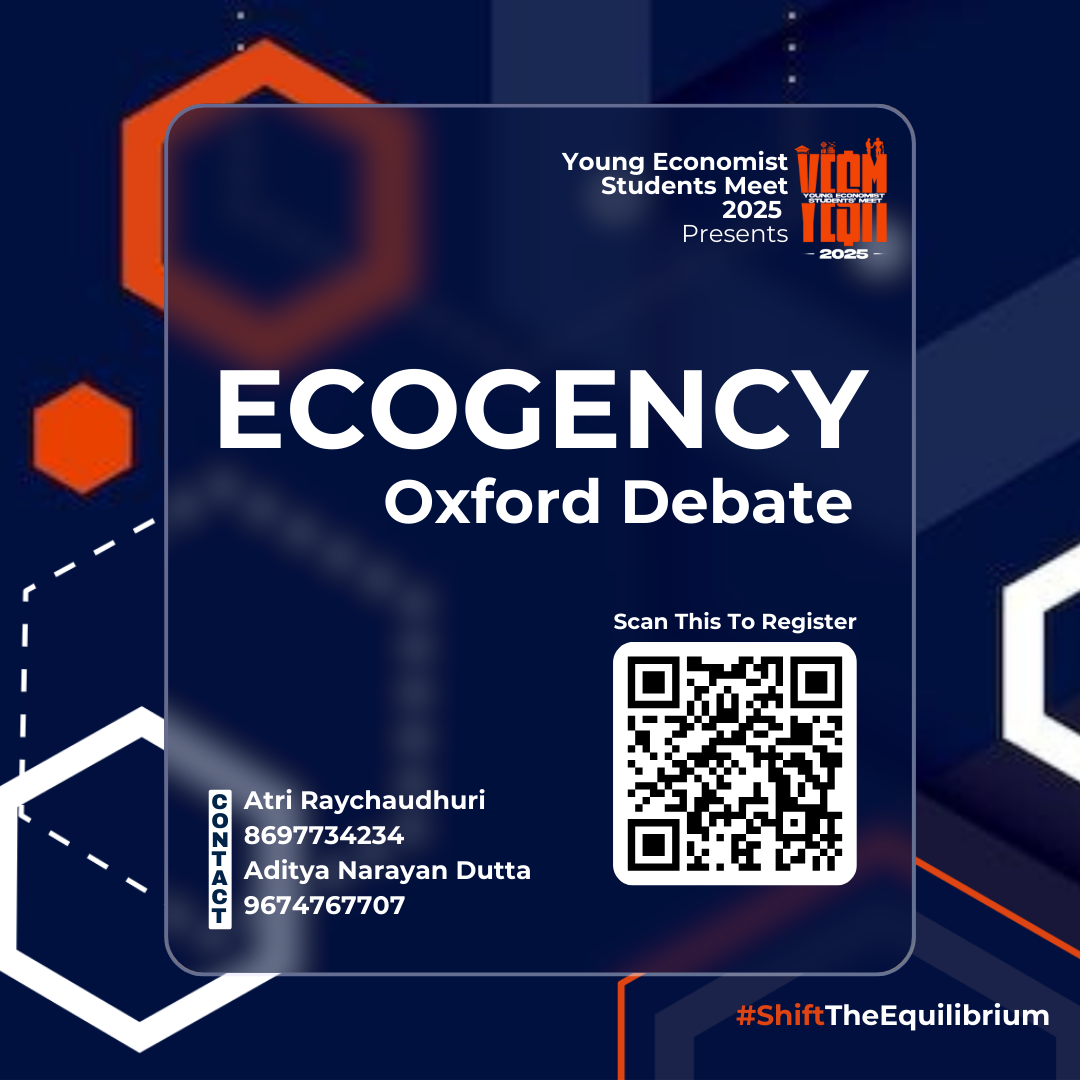Ecogency
"To be or not to be"
Ecogency brings you a thrilling Oxford Debate competition designed to test your skills in proving, disproving, denying, asserting, questioning, and refuting arguments to reach a conclusion. If you believe that settling for a bargain at the toss of a coin isn’t your type and instead hurling the sharpest critique and building the strongest defense is your forte, this event is for you!
Debate, deliberate, refute, reject, establish, defend, and share your novel points of view on the emerging economic horizon. Agree, disagree, and bag your prize!
Contact:
1. Atri Raychaudhuri: +91 86977 34234
2. Aditya Narayan Dutta: +91 96747 67707
For further queries, send us a mail at ecogency25@yesm.in.
Last date of registration: 31st January, 2025

Important Instructions
- Speakers are encouraged not to read out their speech from a sheet of paper/device. Facts and figures may be referred to.
- The use of unparliamentary language will lead to disqualification.
- The decision of the judges will be final and cannot be challenged by any participant in any case.
- The decision of the coordinators regarding all aspects of the event will be final and must be adhered to.
Prizes
- The best speakers for and against the topic shall receive a cash prize of ₹750 each, a trophy, and a certificate of merit.
- All participants shall receive participation certificates.
Rules and Regulations
- The event is open to enrolled high school (+2) and undergraduate and postgraduate students of any discipline.
- Participants can register individually as well as in teams of two. Individual registration fee is ₹150. Team registration fee is ₹250.
- Individual participants will be paired up in random.
- Cross-college/university teams are allowed.
- In each team, one participant will be allotted to speak for the motion and the other will be allotted to speak against the motion. The Organizing Committee will randomly do this allotment.
- The event will be conducted in person at the Jadavpur University Main campus.
- Finalists will be required to provide the organizers with valid proof of their present qualification.
- For the finals, team allotment for the qualifying participants will be done by the Organizing Committee.
Debate Structure:
Preliminary Round:
- The motion for the preliminary round will be provided 24 hours before the commencement of the debate.
- The proposition gives the first speech, followed by the opposition.
- Teams can research and prepare their opening statements in advance.
- Speeches should contain an explanation of the topic, acknowledgement of the opposing team’s concerns and directly address those concerns.
- Each speaker will get 3 minutes to present their argument followed by 1 minute of cross-questioning.
- On the exhaustion of the speaker’s list, each speaker will be asked to deliver their closing remarks for 1 minute. This should encapsulate the points brought up throughout the debate and should be an aggregate opinion of the side they represent. No new points should be introduced in the closing statement.
Final Round:
- Topic to be given to the finalists 2 hours before the commencement of the finals.
- The initial structure is the same as the preliminary round, which is the formal debate.
- The speaking time allotted for each speaker is (4+2) for opening statements and rebuttals.
- After the first round of speech, the judges present their views, identify clashes and provide direction to the house. This paves the way for an informal debate where the moderator recognises speakers one by one as the speakers come up with their statements.
- The duration of the informal debate is 15 minutes and per speaker time is 30 seconds.
- At the end of the informal debate, the speakers will be asked to deliver their closing statements, the duration per speaker is 1 minute.
Selection Procedure:
- The top 20 participants from the prelims will qualify individually to the finals.
- Participants will be judged on the following criteria weighted in descending order:
- Quality of arguments.
- Analysis (use of facts/statistics).
- Use of cross-examination and rebuttal.
- Engagement with the opposition.
- Diction and confidence.
- Organisation and clarity of points.